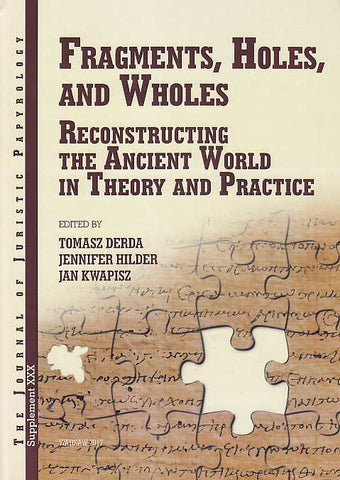Fragments, Holes, and Wholes, Reconstructing The Ancient World in Theory and Practice
70,00 $
ISBN: 978-83-946848-0-8
Description: hardback, 409 pp. (24x17cm)
Condition: new
Weight: 1055g.
Tomasz Derda, Jennifer Hilder, Jan Kwapisz (eds.), Fragments, Holes, and Wholes, Reconstructing The Ancient World in Theory and Practice, JJP Supplement, vol. 30, Warsaw 2017
PREFACE
NOTES ON CONTRIBUTORS AND EDITORS
INTRODUCTION
Jan Kwapisz, Fun from fragments
PART ONE: PROLEGOMENA TO FRAGMENTOLOGY
Joshua T. Katz, Reconstructing the pre-ancient world in theory and practice
Hans-Joachim Gehrke, Fragmentary evidence and the whole of history
Annette Harder, From pieces to pictures
PART TWO: FROM FRAGMENTS TO CONTEXTS
Han Baltussen, Slim pickings and Russian dolls? Presocratic fragments in peripatetic sources after Aristotle
Ilaria Andolfi, Hecataeus Milesius: A textual approach to selected fragments of the Genealogies
Gertjan Verhasselt, Reconstructing lost prose literature: The fragments of Dicaearchus
S. Douglas Olson, Some unattributed fragments of Eupolis: Problems and possibilities
PART THREE: FROM CONTEXTS TO FRAGMENTS
Renate Schlesier, How to make fragments: Maximus Tyrius’ Sappho
Eran Almagor, Facts, fragments and fiction: Plutarch’s Solon
Henriette van der Blom, Sulla in the contio: An oratorical episode in pieces
PART FOUR: FRAGMENTS THEMSELVES
Christophe Cusset & Antje Kolde, Fragments of a female lover’s discourse: Inconsistent discourse or consistent text? The Fragmentum Grenfellianum (P. Dryton 50)
Martin Stöckinger, Fragments, wholes, and missing ends? The Carmina Einsidlensia and the question of bucolic closureVictor M. Martínez, Rethinking the fragmentary (w)hole in archaeology: a microscopic paradigm for understanding macroscopic problems
PART FIVE: FRAGMENTS OF GRAND DISCOURSES
Lech Trzcionkowski, Collecting the dismembered poet: the interplay between the whole and fragments in the reconstruction of Orphism
Marquis Berrey, Technology, performance, loss: Reconstructing Andreas of Carystus’ surgical machine
Jennifer M. Hilder, Making wholes: Using exemplary fragments in the Rhetorica ad Herennium
PART SIX: FRAGMENTOLOGISTS AT WORK
Ettore Cingano, Epic fragments on Theseus: Hesiod, Cercops, and the Theseis
Giuseppe Ucciardello, Reconstructing Greek lyric poetry from papyrus fragments: the case of P. Oxy. 32.2624 (choral lyric)
Karol Mysliwiec, Hole or whole? A cemetery from the Ptolemaic period in Saqqara
EPILOGUE
Han Baltussen & S. Douglas Olson, A conversation on fragments
GENERAL INDEX
The present volume offers a variety of case studies rather than a theoretically oriented survey of trends and overall approaches towards the fragmentarily preserved ancient material. Nevertheless, the discussions of specific cases are not confined to merely illustrating with examples the patterns already detected and followed by scholars, but also formulate some new theoretical proposals applicable to different kinds of material.
This book stems from the international conference Fragments, Holes, and Wholes: Reconstructing the Ancient World in Theory and Practice (Warsaw, 12–14 June 2014), which was organized by the Committee on Ancient Culture of the Polish Academy of Sciences, the Institute of Classical Studies of the University of Warsaw, the Institute of Archaeology of the University of Warsaw, and the Institute of Classical Studies of Adam Mickiewicz University in Poznan.

